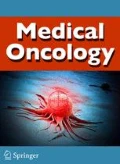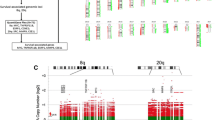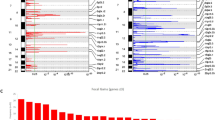Abstract
The centrosome-associated kinase aurora A (AURKA) has been shown to be involved in genetic instability and to be over-expressed in several human carcinomas including gastric cancers (GCs). The chromosome locus of AURKA, 20q13, is frequently amplified in GCs, and the functional impact of such regions needs to be extensively investigated in large amount of clinical samples. Case-matched tissues of gastric carcinomas and adjacent normal epithelium (n = 141) were included in this study. Quantitative PCR was carried out to examine the copy number and mRNA expression of AURKA in GCs. Our results showed copy-number gains of AUKRA were detected in a relative high percentage of GC samples (30.5%, 43 out of 141). There was a positive correlation between copy-number increase of AURKA and tumor progression. And copy-number gains of AURKA also showed a positive correlation with mRNA over-expression in GCs. However, expression level of AURKA mRNA was also enhanced in the group of GC samples with unaltered copy numbers. These findings indicated that sporadic gastric cancers exhibit different mechanisms of AURKA regulation and that this may impact the efficacy of aurora-targeted therapies.

Similar content being viewed by others
References
Goepfert TM, Brinkley BR. The centrosome-associated aurora/ipl-like kinase family. Curr Top Dev Biol. 2000;49:331–42.
Kimura M, Okano Y. Aurora kinases and cancer. Gan To Kagaku Ryoho. 2005;32:1–5.
Ikezoe T. Aurora kinases as an anti-cancer target. Cancer Lett. 2008;262(1):1–9.
Kamada K, Yamada Y, Hirao T, Fujimoto H, Takahama Y, et al. Amplification/overexpression of aurora-a in human gastric carcinoma. Potential role in differentiated type gastric carcinogenesis. Oncol Rep. 2004;12:593–9.
Dar AA, Zaika A, Piazuelo MB, Correa P, Koyama T, et al. Frequent overexpression of aurora kinase a in upper gastrointestinal adenocarcinomas correlates with potent antiapoptotic functions. Cancer. 2008;112:1688–98.
Park HS, Park WS, Bondaruk J, Tanaka N, Katayama H, et al. Quantitation of aurora kinase a gene copy number in urine sediments and bladder cancer detection. J Natl Cancer Inst. 2008;100:1401–11.
Andrews J, Kennette W, Pilon J, Hodgson A, Tuck AB, et al. Multi-platform whole-genome microarray analyses refine the epigenetic signature of breast cancer metastasis with gene expression and copy number. PLoS One. 2010;5:e8665.
Diskin SJ, Hou C, Glessner JT, Attiyeh EF, Laudenslager M, et al. Copy number variation at 1q21.1 associated with neuroblastoma. Nature. 2009;459:987–91.
Liu W, Sun J, Li G, Zhu Y, Zhang S, et al. Association of a germ-line copy number variation at 2p24.3 and risk for aggressive prostate cancer. Cancer Res. 2009;69:2176–9.
Buffart TE, van Grieken NC, Tijssen M, Coffa J, Ylstra B, et al. High resolution analysis of DNA copy-number aberrations of chromosomes 8, 13, and 20 in gastric cancers. Virchows Arch. 2009;455:213–23.
Sakakura C, Mori T, Sakabe T, Ariyama Y, Shinomiya T, et al. Gains, losses, and amplifications of genomic materials in primary gastric cancers analyzed by comparative genomic hybridization. Genes Chromosom Cancer. 1999;24:299–305.
Vauhkonen H, Vauhkonen M, Sajantila A, Sipponen P, Knuutila S. DNA copy number aberrations in intestinal-type gastric cancer revealed by array-based comparative genomic hybridization. Cancer Genet Cytogenet. 2006;167:150–4.
Lam AK, Ong K, Ho YH. Aurora kinase expression in colorectal adenocarcinoma. Correlations with clinicopathological features, p16 expression, and telomerase activity. Hum Pathol. 2008;39:599–604.
Lassmann S, Danciu M, Muller M, Weis R, Makowiec F, et al. Aurora a is differentially expressed and regulated in chromosomal and microsatellite instable sporadic colorectal cancers. Mod Pathol. 2009;22:1385–97.
Kyrlagkitsis I, Karamanolis DG. Genes and gastric cancer. Hepatogastroenterology. 2004;51:320–7.
Wu CW, Chi CW, Lin WC. Gastric cancer. Prognostic and diagnostic advances. Expert Rev Mol Med. 2002;4:1–12.
Kikuchi K, Ueda M, Kitajima M. Molecular biology in gastric cancer. Gan To Kagaku Ryoho. 1999;26:2139–46.
Dear PH. Copy-number variation. The end of the human genome? Trends Biotechnol. 2009;27:448–54.
Shlien A, Tabori U, Marshall CR, Pienkowska M, Feuk L, et al. Excessive genomic DNA copy number variation in the li-fraumeni cancer predisposition syndrome. Proc Natl Acad Sci USA. 2008;105:11264–9.
Grubor V, Krasnitz A, Troge JE, Meth JL, Lakshmi B, et al. Novel genomic alterations and clonal evolution in chronic lymphocytic leukemia revealed by representational oligonucleotide microarray analysis (roma). Blood. 2009;113:1294–303.
Gunnarsson R, Staaf J, Jansson M, Ottesen AM, Goransson H, et al. Screening for copy-number alterations and loss of heterozygosity in chronic lymphocytic leukemia–a comparative study of four differently designed, high resolution microarray platforms. Genes Chromosom Cancer. 2008;47:697–711.
Schafer M, Schwender H, Merk S, Haferlach C, Ickstadt K, et al. Integrated analysis of copy number alterations and gene expression. A bivariate assessment of equally directed abnormalities. Bioinformatics. 2009;25:3228–35.
Strefford JC, van Delft FW, Robinson HM, Worley H, Yiannikouris O, et al. Complex genomic alterations and gene expression in acute lymphoblastic leukemia with intrachromosomal amplification of chromosome 21. Proc Natl Acad Sci USA. 2006;103:8167–72.
Sulong S, Moorman AV, Irving JA, Strefford JC, Konn ZJ, et al. A comprehensive analysis of the cdkn2a gene in childhood acute lymphoblastic leukemia reveals genomic deletion, copy number neutral loss of heterozygosity, and association with specific cytogenetic subgroups. Blood. 2009;113:100–7.
Vauhkonen H, Vauhkonen M, Sipponen P, Knuutila S. Oligonucleotide array comparative genomic hybridization refines the structure of 8p23.1, 17q12 and 20q13.2 amplifications in gastric carcinomas. Cytogenet Genome Res. 2007;119:39–45.
Aust DE, Muders M, Kohler A, Schmidt M, Diebold J, et al. Prognostic relevance of 20q13 gains in sporadic colorectal cancers. A fish analysis. Scand J Gastroenterol. 2004;39:766–72.
Dermitzakis ET, Stranger BE. Genetic variation in human gene expression. Mamm Genome. 2006;17:503–8.
Reymond A, Henrichsen CN, Harewood L, Merla G. Side effects of genome structural changes. Curr Opin Genet Dev. 2007;17:381–6.
Guryev V, Saar K, Adamovic T, Verheul M, van Heesch SA, et al. Distribution and functional impact of DNA copy number variation in the rat. Nat Genet. 2008;40:538–45.
Henrichsen CN, Vinckenbosch N, Zollner S, Chaignat E, Pradervand S, et al. Segmental copy number variation shapes tissue transcriptomes. Nat Genet. 2009;41:424–9.
Fujita Y, Sakakura C, Shimomura K, Nakanishi M, Yasuoka R, et al. Chromosome arm 20q gains and other genomic alterations in esophageal squamous cell carcinoma, as analyzed by comparative genomic hybridization and fluorescence in situ hybridization. Hepatogastroenterology. 2003;50:1857–63.
Agnese V, Cabibi D, Calcara D, Terrasi M, Pantuso G, et al. Aurora-a overexpression as an early marker of reflux-related columnar mucosa and barrett’s oesophagus. Ann Oncol. 2007;18(Suppl 6):vi110–5.
Tong T, Zhong Y, Kong J, Dong L, Song Y, et al. Overexpression of aurora-a contributes to malignant development of human esophageal squamous cell carcinoma. Clin Cancer Res. 2004;10:7304–10.
Tanaka E, Hashimoto Y, Ito T, Okumura T, Kan T, et al. The clinical significance of aurora-a/stk15/btak expression in human esophageal squamous cell carcinoma. Clin Cancer Res. 2005;11:1827–34.
Yamashita K, Igarashi H, Kitayama Y, Ozawa T, Kiyose S, et al. Chromosomal numerical abnormality profiles of gastrointestinal stromal tumors. Jpn J Clin Oncol. 2006;36:85–92.
Jeng YM, Peng SY, Lin CY, Hsu HC. Overexpression and amplification of aurora-a in hepatocellular carcinoma. Clin Cancer Res. 2004;10:2065–71.
Rojanala S, Han H, Munoz RM, Browne W, Nagle R, et al. The mitotic serine threonine kinase, aurora-2, is a potential target for drug development in human pancreatic cancer. Mol Cancer Ther. 2004;3:451–7.
Zhu J, Abbruzzese JL, Izzo J, Hittelman WN, Li D. Aurka amplification, chromosome instability, and centrosome abnormality in human pancreatic carcinoma cells. Cancer Genet Cytogenet. 2003;2005:159.10–7.
Li D, Zhu J, Firozi PF, Abbruzzese JL, Evans DB, et al. Overexpression of oncogenic stk15/btak/aurora a kinase in human pancreatic cancer. Clin Cancer Res. 2003;9:991–7.
Nishida N, Nagasaka T, Kashiwagi K, Boland CR, Goel A. High copy amplification of the aurora-a gene is associated with chromosomal instability phenotype in human colorectal cancers. Cancer Biol Ther. 2007;6:525–33.
Baba Y, Nosho K, Shima K, Irahara N, Kure S, et al. Aurora-a expression is independently associated with chromosomal instability in colorectal cancer. Neoplasia. 2009;11:418–25.
Sakakura C, Hagiwara A, Yasuoka R, Fujita Y, Nakanishi M, et al. Tumour-amplified kinase btak is amplified and overexpressed in gastric cancers with possible involvement in aneuploid formation. Br J Cancer. 2001;84:824–31.
Author information
Authors and Affiliations
Corresponding author
Additional information
Z. Fang and Y. Xiong contributed equally to this work.
Rights and permissions
About this article
Cite this article
Fang, Z., Xiong, Y., Li, J. et al. Copy-number increase of AURKA in gastric cancers in a Chinese population: a correlation with tumor progression. Med Oncol 28, 1017–1022 (2011). https://doi.org/10.1007/s12032-010-9602-4
Received:
Accepted:
Published:
Issue Date:
DOI: https://doi.org/10.1007/s12032-010-9602-4




